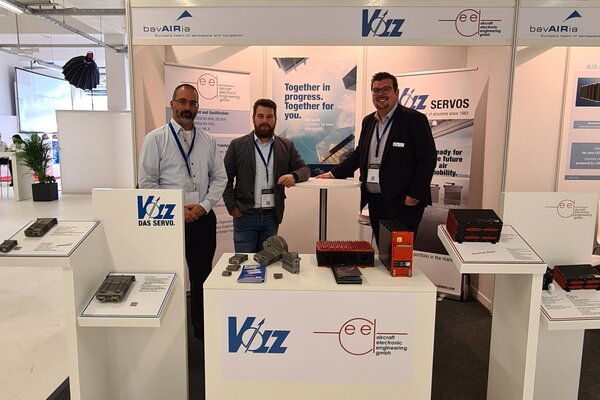When aircrafts such as delivery drones or air taxis want to take off from experimental status into professional, commercial use, even the most ambitious project must meet the strict requirements of national and international aviation standards. Indispensable here: components that enable the required certification as part of the overall system.
What sounds simple is in practice an extremely complex process that requires specialised knowledge and experience. Based on this consideration, Volz Servos GmbH & Co. KG joined forces with Aircraft Electronic Engineering GmbH (AEE) in the summer of 2021. Together with the subsidiary, the German actuator manufacturer now develops and builds certifiable actuators and helps shape forward-looking projects.
Unique combination: experience, agility and certifiability
"If you want to use drones commercially, there is really no other option than to take Volz actuators: because we can develop according to the standards of aviation certification, even for small actuators," says Volz CEO Philipp Volz, summing up the first year of success with AEE. "The EASA certification and the know-how acquired over many years in the aviation industry make AEE GmbH unique compared to other small and medium-sized competitors. Combined with Volz's experience and agility, we are unique in the UAV and AAM actuator market."
From prototype to commercial deployment
"We knew that if we wanted to take the step out of the prototype stage and into professional, commercial applications, there was no way around being able to take the necessary steps towards certifiability ourselves," says Felix Thun, Director Sales & Business Development at Volz. The challenge: In aerospace projects, this is an individual process for each project, each customer, because the entire system including actuators has to be certified.
"Customers know that they have to certify - but often not how to go about it. Through the Volz and AEE experts, we then first clarify all the necessary requirements and steps," says Felix Thun regarding the typical project process. In general, the development process requires close cooperation. "We develop together with the customers, it's a joint process." In addition, there is the motivation of the Volz experts: "Through the cooperation with AEE, we are constantly learning about the topic of developing aviation products ourselves. This also inspires our engineers time and again."
Accuracy brings safety
The complete development of the actuators required for the aircraft must be documented precisely and completely in the Declaration of Design and Performance (DDP) right from the start. There are precise specifications regarding materials, software, electronics etc. The manufacturer then applies to the FAA and/or EASA for approval of his entire system including the actuator. Once this so-called Type Certificate (TC) or Supplemental Type Certificate (STC) has been issued, Volz produces the actuators. AEE is responsible for the process and the final testing. Specially trained experts (Certifying Staff) issue the EASA Form1 (Authorised Release Certificate) and thus confirm that the production has been carried out exactly according to the production data specified in the development.
Sounds time-consuming - and it is. It can take two to three years from the first meeting to the certificate - whether a somewhat simplified procedure is possible for unmanned aerial vehicles such as delivery drones will become clear in the near future. With Volz and AEE, customers have partners at their side who accompany the path to a certified aircraft with experience and expertise. Because one thing is certain: the high safety requirements for an aviation certification make sense.
Many companies would already like to deliver innovative drone applications today - be it for cargo, passenger transport or for control and maintenance tasks. Yet the laws and regulations of public airspace present a real challenge. With 40 years of experience, Volz Servos knows how to meet these requirements, not least through its cooperation with AEE. Philipp Volz: "Our actuators thus play an important role in the safe integration of UAVs and AAMs into civil airspace."
